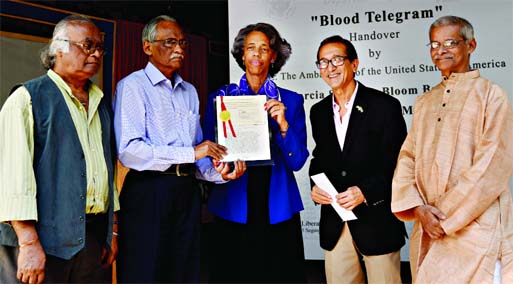
Staff Reporter :US Ambassador Marcia Stephens Bloom Bernicat has said political dialogue and safe space for exercising rights of opposition are essential components for nourishing democracy.The US envoy made the statement while addressing a programme at Liberation War Museum in the city’s Segunbagicha on Sunday.”Freedom of expression and differing of opinions are significant contributors to democratic process. Freedom is what you fought for, and freedom is a vital component of democracy. It’s also an important element for liberation. People of this land had fought for liberation and democracy,” she said. The US Ambassador handed over an original copy of the ‘ Blood Telegram’ signed by the then US Consul General Archer K Blood [who was assigned in Dhaka in 1971] and his colleagues with the seal of the US State Department to the Liberation War Museum.The ‘Telegram’ was received by Trustee Board members of Liberation War Museum Sarwar Ali, Raobiul Hussain, Ziauddin Tarique Ali and Akku Chowdhury. “Consul General Archer K Blood and the co-signers of the telegram embodied the importance of dissent and its role in sustaining an operational democracy,” Bernicat noted. The messages known as ‘Blood Telegram’ were seen as one of the most strongly-worded dissenting messages in the history of the US Foreign Service. At least 29 US Foreign Service officials had signed the ‘Telegram’ at that time. The signatories raised their dissenting voices against the US government policy towards Bangladesh at that time.Archer Kent Blood was called back couple of months into the Liberation War as his superiors in Washington found his role against the genocide unacceptable. Pakistan was a close US ally and member of Washington-sponsored alliances.”With deep respect for the legacy, I present you an authenticated copy of the ‘Blood Telegram’, complete with the seal of the United States National Archives,” Bernicat said.Terming it a “special gift” to the museum, she said Consul General Blood and those who signed his despatches “embodied the importance of dissent and its role in sustaining an operational democracy”. “This document is yet another measure of America’s longstanding relationship with Bangladesh and of their shared democratic values. This telegram is a great legacy for every Foreign Service officer. It is a strong reminder of the value in voicing dissenting views against existing power and authority structures,” she said.She said the Liberation War Museum, a historically and culturally important place to visit, both for Bangladesh citizens and for foreign visitors to Bangladesh. “I’m honored to meet with the freedom fighters who fought for the cause of Bangladesh’s independence. I convey my profound and deep respect for the struggle Bangladesh to become an independent and secular state,” she noted.

